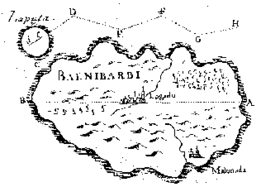Laputa
Laputa is an imaginary island described in the book Gulliver's Travels, by Jonathan Swift, with the ability to fly. It has a diamond base and floats in the air by means of a gigantic magnet. This natural device allows its inhabitants to direct it in any direction over the territory of Balnibarbi (the only one where the minerals respond to the magnetic influence of the island) and, in this way, dominate it.
Its inhabitants
The people of Laputa are very interested in mathematics and music, but they don't know how to use their knowledge for practical purposes. Described as distracted, they get lost when conversing with others, which is why they are assisted by "hitters" They tell you when to talk and when to listen.
The women of the island, little versed in the aforementioned sciences, often take lovers from the island of Balnibarbi and occasionally flee with them to the mainland. Gulliver discovers that they spend more thinking about projects than putting them into execution. On his visit, the author is informed that they have discovered two satellites of Mars (a century before their actual discovery), that they have listed more than ten thousand fixed stars and calculated with great precision the period of 93 comets. His poor ability is revealed when the author recounts his inability to properly design clothes.
The description of the island of Laputa and its rulers appears to be a satire on the Royal Society.
Cinema
Miyazaki
In Hayao Miyazaki's animated film Laputa: Castle in the Sky there is a floating city called Laputa, after the island in Jonathan Swift's book. Swift probably knew what the word puta meant in Spanish, but Miyazaki probably did not. However, the Walt Disney Company did, and as a distributor of Miyazaki's films in the United States and in Spanish-speaking countries in America and Spain, it contracted the title to The castle in the sky. In the old Spanish dubbing of the film, when they refer to the floating island of Laputa, they call it Lapunto. In the version dubbed into Spanish in Mexico they do mention the word "Laputa", as in the new Spanish dubbing supervised by Miyazaki so that it could be as faithful as possible to the original.
Music
During the 90s, a band called Laputa was active in Japan, within the current of visual rock. Its name is an allusion to the floating island in Gulliver's Travels.
Translations
Given the obvious profanity in Spanish as "la puta" —which was deliberately used by Jonathan Swift in reference to Great Britain and its domination over Ireland—, many translators and editors have decided to change the name to something similar, for example: Lupata, Laput or Lapuda. Of course, in this way the original intention of the author is lost: to represent the exploitation of Ireland that would be Balnibarbi by England, that is, Laputa, in the 18th century.
Contenido relacionado
Kenny McCormick
Kyle Broflovski
Lolita (1997 film)
Latveria
Great Teacher Onizuka
